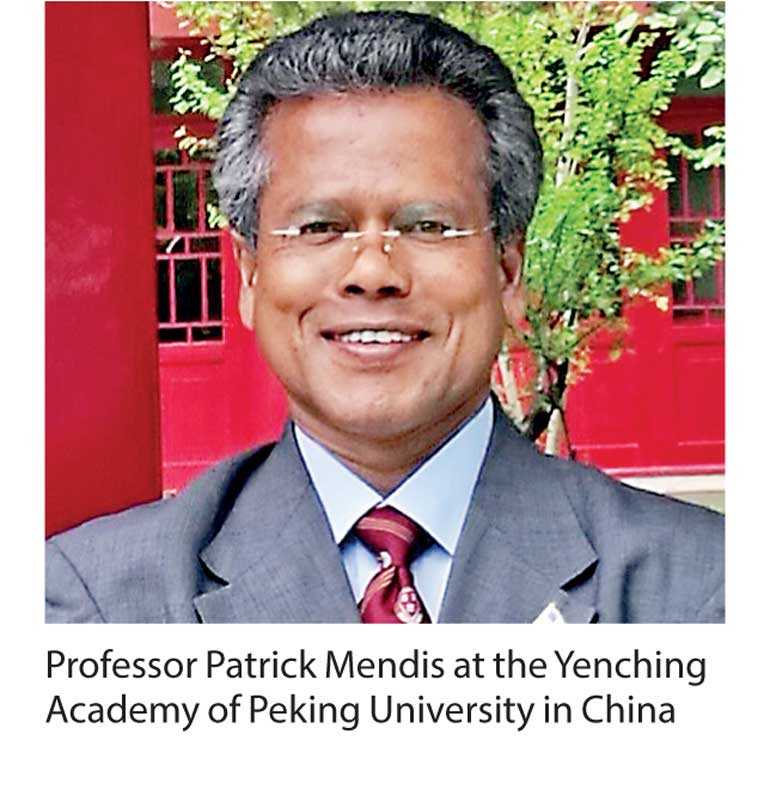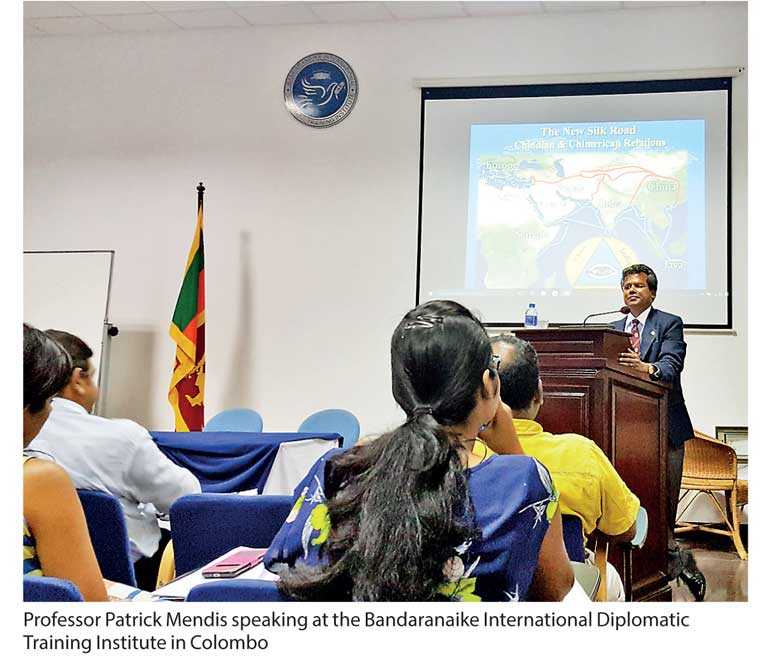Monday Feb 23, 2026
Monday Feb 23, 2026
Friday, 18 May 2018 00:00 - - {{hitsCtrl.values.hits}}

 BEIJING, China: While on his four-nation lecture tour, Professor Patrick Mendis spoke on the past and future of Sino-Sri Lankan relationship at the Yenching Academy of Peking University. “The ancient history of China and Sri Lankan Buddhist relations is now manifested in the Colombo Lotus Tower, a hallmark of President Xi Jinping’s Belt and Road Initiative (BRI),” said the former Rajawali senior fellow of Harvard Kennedy School and currently a research associate at the Fairbank Center for Chinese Studies at Harvard University.
BEIJING, China: While on his four-nation lecture tour, Professor Patrick Mendis spoke on the past and future of Sino-Sri Lankan relationship at the Yenching Academy of Peking University. “The ancient history of China and Sri Lankan Buddhist relations is now manifested in the Colombo Lotus Tower, a hallmark of President Xi Jinping’s Belt and Road Initiative (BRI),” said the former Rajawali senior fellow of Harvard Kennedy School and currently a research associate at the Fairbank Center for Chinese Studies at Harvard University.
After his series of university lectures in Jakarta on ‘Sino-American relations in the South China Sea and Indonesia’, Professor Mendis also gave a public lecture on ‘China’s BRI and Sri Lanka’ at the Beijing Foreign Studies University, which has a collaborative program with the University of Kelaniya.
During his stopover in Sri Lanka, Professor Mendis also delivered the UNESCO lecture at the Polonnaruwa Museum that was organised by Professor Gamini Adikari of the University of Kelaniya and the Central Cultural Fund of Sri Lanka. Born in Polonnaruwa, Professor Mendis is currently serving as an American commissioner to the US National Commission for UNESCO at the State Department in Washington, D.C., where he lives.
A frequent visitor to Sri Lanka, Professor Mendis has lectured on numerous subject matters related to South Asia and the Indian Ocean at the University of Sri Jayewardenepura, his alma mater, as well as at the Sir John Kotelawala Defense University, the University of Kelaniya, the University of Jaffna, the Lakshman Kadirgamar Institute of International Relations and Strategic Studies, the Institute of National Security Studies of the Ministry of Defence, the Sri Lanka International Buddhist Academy of the Sri Dalada Maligawa, and the Bandaranaike International Diplomatic Training Institute.
At the Peking University lecture, Professor Mendis explained to Yenching scholars that the meaning of the Chinese-built Colombo Lotus Tower was inspired by the Lotus Sutra in Buddhism. He then said that “Buddhist diplomacy between the two countries could be traced back to the Han Dynasty.” The Harvard scholar described, “the famous Chinese scholar-monk Faxian (Fa-Hsien) called Sri Lanka as the Buddhist ‘Kingdom of the Lion’ while the venerable Chinese monk Xuanzang in the Tang Dynasty defined it the ‘Sorrowless Kingdom.’”
Furthermore, the professor added, “the Emperor Kublai Khan of the Yuan Dynasty sent Marco Polo to Sri Lanka, followed by the Ming admiral Zheng He, who visited the island several times during his seven voyages.”
During his historic visit to Sri Lanka in 2014, President Xi characterised the Buddhist nation a “splendid pearl” as part of the rejuvenation of religious and cultural heritage for “a global community of shared destiny,” Professor Mendis explained.
In China, he has numerous appointments, including a visiting researcher at the National Confucius Research Institute of China, a senior fellow of the South China Sea Institute at the Qufu Normal University, a distinguished visiting professor of Asian-Pacific affairs at Shandong University, a distinguished visiting professor of international relations at Northwest University in Xian, and a senior fellow of the Pangoal Institution in Beijing.
The award-winning American diplomat has authored more than 100 books, journal articles, and newspaper columns. A fellow of the World Academy of Art and Science, he is listed in “Who’s Who in America” as well as “Who’s Who in the World”.